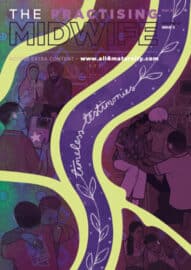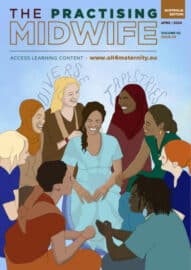Birth Planning When a Baby has Died
Angie Bowles – Private Midwife
Social @thespecialmidwife
Published in The Practising Midwife Volume 27 Issue 3 May 2024, Page 19
https://doi.org/10.55975/KFPK6531
As a private midwife, alongside ‘normal’ full continuity care, I provide specialist care for those facing loss and in pregnancy after loss.
Parents often report that the days following identification of their baby’s death passed in a blur. Later they think about things they might have chosen to do if they had the opportunity. This is an experience common with sudden bereavements.1 The following are a few issues to consider.
Because the death of a baby before birth is such an unfamiliar event in our society, most parents will not know what to ask. They are likely to appreciate guidance about the choices and options are available to them. These are outlined in the National Bereavement Care Pathway2 for those living in the UK.
Many people will want to name their baby. Cultural beliefs and practices may mean that this is considered inappropriate, so I tend to ask ‘does your baby have a name?’ continuing to ‘do you want to choose one?’. If the baby is named, it is important that we use it. These parents may not hear their child’s name spoken very often.
A bereavement suite is not the right place for everyone. Can you support a woman to give birth at home or in a birth centre when their baby has died? I recently supported a client who chose to have a waterbirth after a late termination of pregnancy. I will always remember her cradling her baby underwater, still enclosed in the membranes, as she marvelled at the beauty of her child in that time of devastating grief.
The use of aromatherapy oils can be suggested as an aid to creating a supportive environment. The particular smells may always trigger memories of their baby. Likewise, the use of beautifully fragranced body creams or bath products can create a sense of calm. Relaxation can also provide a link to memories.3
Parents may want wider family members to visit them with their baby but be afraid to ask. If the baby has siblings, consider how you could facilitate and support them meeting the baby.
Whether or not the parent(s) have a religious faith, many appreciate contact with a faith leader or a hospital chaplain.
Do you know how to contact the relevant person?
Taking baby home is something which some parents will choose, if they know it is an option. Could you lend them a cold cot? There is no legal requirement to use a funeral director.
Choosing a personal blanket, clothes or other items which can be added to a memory box is far more meaningful than staff providing a pre-filled box. Parents may wish to write a letter to their baby or to prepare a selection of family photos to go with the baby to cremation or burial. TPM
“The use of aromatherapy oils can be suggested as an aid to creating a supportive environment. The particular smells may always trigger memories of their baby.”
References
- Mowll J. Reality and regret. Bereavement Care. 2007;26(1):3-6. doi.org/10.1080/02682620708657676.
- National Perinatal Bereavement Care Pathway. NBCP. https://nbcpathway.org.uk/. Published January 28, 2024. Accessed March 02, 2024.
- Millar B, Richardson L. Grief, Smell and the Olfactory Air of a Person. Pacifi c Philosophical Quarterly. 2023;104(4):769-790. doi.org/10.1111/papq.12443.








